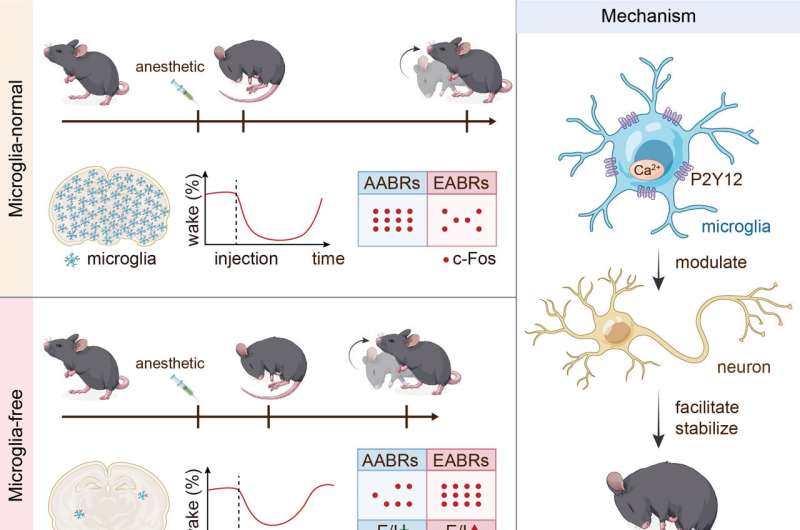This article has been reviewed according to Science X's editorial process and policies. Editors have highlighted the following attributes while ensuring the content's credibility:
fact-checked
peer-reviewed publication
trusted source
proofread
Microglia act as a 'facilitator and stabilizer' for anesthesia, finds study

Though it may be a surprise to the millions of people who undergo general anesthesia every year for medical procedures, the biological mechanism for how different anesthetics block consciousness is still not fully understood. However, researchers may be one step closer after uncovering how small immune cells in the brain called microglia are impacted by general anesthesia.
The research was presented in a eLife paper.
"We found that microglia play an important role in regulating the body's response to general anesthesia. Microglia are important immune cells in the central nervous system (CNS) that play critical roles in CNS function and dysfunction," said Bo Peng, a professor in the Institute for Translational Brain Research at Fudan University in Shanghai, China.
Previous microglia research has shown that the cells' behavior changes while under anesthesia, but this study is the first that demonstrates how microglia regulate neuronal activity in a brain region-specific manner and play a key role in how anesthesia works.
The first glimpse of how microglia impact the effectiveness of anesthesia was observed unintentionally during other research and then confirmed through additional testing. Microglia depletion was induced in mice by blocking the colony-stimulating factor 1 receptor (CSF1R) signaling.
When microglia were killed with a CSF1R inhibitor called PLX5622, there was a strong resistance to anesthesia. This resistance to anesthesia was observed with four different types of anesthesia with two different receptors and the observations were confirmed through electroencephalography (EEG) and electromyography (EMG) measurements.
Microglia also regulate brain network activity in a region-specific manner instead of a universal manner. Different parts of the brain regulate anesthesia induction and emergence. Induction is when the animal receiving general anesthesia goes from consciousness to unconsciousness, while emergence is when the patient goes from unconsciousness to consciousness.
"We identified that microglia can facilitate and stabilize the response to general anesthesia via modulating the neuronal network in a brain region-specific manner. This is mediated by the microglial P2Y12 receptor and its downstream calcium signaling," said Peng.
Because of this brain region-specific regulation, microglial depletion not only delayed how long it took for anesthesia to work (delayed induction), but it also meant the anesthesia wore off faster (early emergence).
"Our results also indicate that microglia sophisticatedly and diversely contribute to orchestrating the CNS function, rather than play an indiscriminate role of negative feedback control," said Peng.
Looking ahead, researchers want to understand more about the microglial cells and how the P2Y12 receptor relates to neurological disorders. This receptor is essential for a stable neuronal network, and it is suppressed in multiple neurological disorders.
Additionally, researchers will continue to learn how general anesthesia works. "Looking ahead, we plan to continue to dissect the mechanism of general anesthesia and study how microglia contribute to the central nervous system (CNS) function," said Yousheng Shu, who is also a professor at the Institute of Translation Brain Research at Fudan University.
More information: Yang He et al, Microglia facilitate and stabilize the response to general anesthesia via modulating the neuronal network in a brain region-specific manner, eLife (2023). DOI: 10.7554/eLife.92252


















